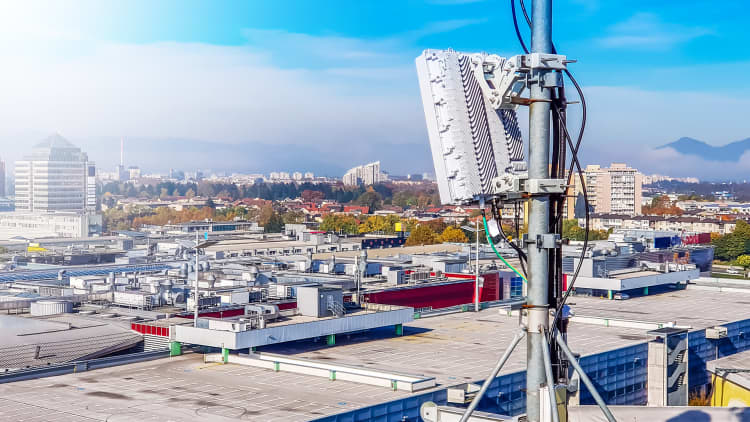A lull in innovation is one of the major forces behind a recent plunge in venture capital (VC) investment in Chinese technology companies, according to investors who spoke to CNBC.
The value of VC investment in China was $9.7 billion in the second quarter of 2019, according to financial data company Preqin. This was down by nearly 77% from the $41.3 billion invested in the same period last year.
China has spawned some of the world's largest private technology companies like TikTok parent, Bytedance and Alibaba affiliate, Ant Financial. But investors say the country's tech sector lacks innovation.
"If you look at the past decade, there is a lot of low hanging fruit when there is the first mobile boom. And then after mobile, there hasn't been a new … platform to host and spawn out of the new innovations coming out of the platform," Yuan Liu, managing director of China-based VC fund Zhenfund, told CNBC in an interview.
"So people were thinking whether VR (virtual reality) will be the next big thing, whether crypto will be the next big platform that would … do this. They didn't turn out to be," Liu said. "And AI (artificial intelligence), there is a lot of hope for that. And then after AI … investors started to think, is AI a bubble?"
For now, he said, "there hasn't been many innovations in the market so investors haven't seen anything that excites them."
That sentiment was echoed by Jixun Foo, managing partner at GGV Capital, a venture capital firm that invests in entrepreneurs in the U.S., Asia and other emerging economies.
Foo has invested in large Chinese technology companies such as ride-hailing service DiDi, and electric car start-up Xpeng Motors. During a CNBC-hosted panel at the RISE conference in Hong Kong, Foo said the "innovation wave" has "slowed down."
"Things always goes in cycles," Foo said. "If you were to project forward where 5G comes up, there will be a new innovation wave. From 3G to 4G we see short form video. What will come with 5G, with AR (augmented reality), with VR, there may be new innovation waves that will propel new investment."

5G refers to next-generation mobile networks that promise super-fast data speeds with the ability to support new technologies like driverless cars.
"There is no lack of capital. It's just where money is being put, there needs to be innovation that drives this new capital requirement," Foo added.
Trade war worries
Other investors cited the ongoing U.S.-China trade war as well as poor performance of some Chinese technology companies in the public markets, as factors for the fall in investment.
"It has a lot to do with the confidence level with the China-U.S. trade war definitely part of it," Edith Yeung, managing partner at Proof of Capital, told CNBC. "And then I think also a lot of the IPOs (initial public offering) that happened in 2018 haven't really performed … so it sends not-so-good of a signal for the early VCs."
Chinese tech companies have been caught in the middle of tensions between the U.S. and China. Huawei, for example, has been put on a U.S. blacklist that restricts American companies from selling to the Chinese firm. Some of those restrictions have since been eased. While Huawei is not publicly listed, negative sentiment toward Chinese technology firms have played out in the public markets, particularly with some of the companies that have listed in the past year.
Smartphone maker Xiaomi, which went public in July 2018, is down over 26% this year. Shares of electric carmaker NIO, which is listed in the U.S., are down more than 46% this year.
The concern over the public market performance of Chinese tech firms has had an effect on early stage venture investors.
"When you see the public markets not performing well, the pre-IPO or the growth equity guys will be more cautious when they look at their valuation metrics and dynamics … which will then trickle down to the series B guys," Liu said. Series B refers to a relatively early stage funding round for businesses.
'Cash burn' concerns
Many start-ups looking to grow quickly burn through cash to gain market share and scale with the aim of trying to achieve profitability later on. Some public companies also continue to lose money as they sink money into growing the company.
Liu of Zhenfund, which is an early stage investor, said companies are now discussing "unit economics" earlier in their fund-raising, something that didn't happen five years ago.
Unit economics refers to the revenue and costs associated with a company's business model. In the case of many internet companies, a single user is the unit. Working out unit economics can be a way of projecting how profitable a company will be and if their business model is viable.
Liu said he is advising companies to act like they won't be able raise money for the next 6-12 months.
Some start-ups are also looking to raise funds so they have some money in case things turn sour.
"Some of them raise money, come out to market proactively before they actually need (it), when they have say 12 months' capital to go. They come out now just so they have more buffer because people are uncertain about the future capital market," Liu told CNBC.
Correction: This article has been updated to reflect the correct spelling of the financial data company, Preqin.


